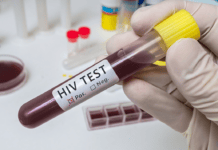Rheumatoid arthritis occurs when the immune system, which is responsible for protecting the body from harmful bacteria, starts to malfunction and attack healthy cells instead. The autoimmune and inflammatory disease can cause inflammation in the joint area of the knees, ankles, hands, and wrists. Patients may feel pain or stiffness when they move. The most common symptoms associated with rheumatoid arthritis include:
- Pain in their joints, back, or muscles
- Swollen joints
- Stiff joints
- Tenderness
- Fatigue
- Redness
- Xerostomia
Over 1.5 million people in the United States are living with rheumatoid arthritis, according to the Arthritis Foundation. Statistics show that women are three times more likely to develop rheumatoid arthritis than men. The invasive disease is typically discovered by a physician and diagnosed when the patient is between the ages of 30 and 60 years old. Patients with rheumatoid arthritis are more inclined to experience bleeding upon probing and higher rates of clinical attachment loss when visiting a dentist. The inflammation caused by rheumatoid arthritis may cause serious damage to the individual’s circulatory system, eyes, heart, and lungs if left untreated.
About the Scientific Studies
There have been multiple studies in the past that examined the link between oral health and rheumatoid arthritis. For example, Frontiers in Immunology published a meta-analysis and systematic review that showed a strong association between periodontitis and rheumatoid arthritis since both are chronic inflammatory conditions. Although rheumatoid arthritis can’t cause periodontal disease, moderate to severe cases of periodontitis can significantly impact the health of a person with rheumatoid arthritis. Scientists believe Porphyromonas gingivalis is one of the biggest contributing factors to this phenomenon since the bacteria causes inflammation. Another systematic review demonstrated that when Porphyromonas gingivalis is removed, it can influence the pathogenesis of patients diagnosed with rheumatoid arthritis.
A University of Geneva study, which can be found in the Journal of Clinical Periodontology, examined whether a patient’s periodontal status affected their level of anti‐citrullinated protein antibodies. The antibodies are present in the majority of patients diagnosed with rheumatoid arthritis. The researchers quickly discovered that patients with anti‐citrullinated protein antibodies were more likely to suffer severe periodontitis along with a higher gingival index, plaque index, probing depth, bleeding on probing, and clinical attachment level.
Lastly, an international study demonstrated that non-surgical periodontal treatment could improve the clinical outcome for patients with rheumatoid arthritis. Scientists came to that conclusion by measuring the improved erythrocyte sedimentation rate, C-reactive protein, anti-cyclic citrulline peptide antibody, and Disease Activity Score 28, which indicated there was less inflammation. Overall, the authors of the study encourage future scientists to conduct more comprehensive studies to further prove that non-surgical periodontal therapy is a favorable treatment option for patients with both periodontitis and rheumatoid arthritis.
In Conclusion
The professional treatment of periodontal disease can reduce inflammation, thereby making an impact on the health of patients living with rheumatoid arthritis. Dentists and dental hygienists should continue to educate themselves about the chronic disease so they will be better equipped to treat patients with the condition and explain how it is linked to their oral health.











